 The Irrationality of Antisemitism
The Irrationality of Antisemitism
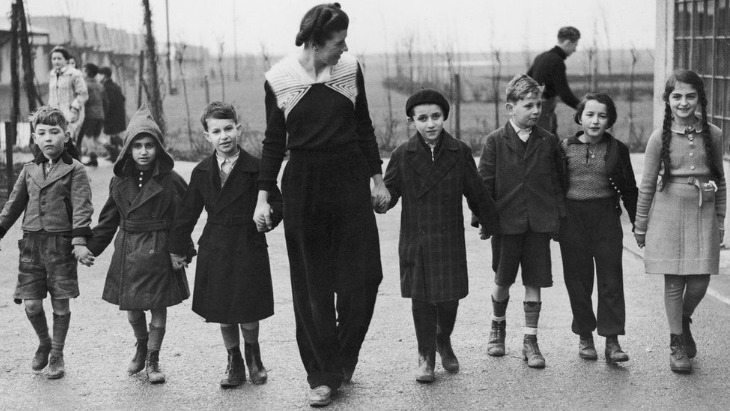

7 min read
Just before WWII, Britain rescued 10,000 Jewish children from Nazi Germany, Austria and Poland, including my mother and her two sisters.
Operation Kindertransport was borne out of the notorious pogrom known as Kristallnacht (The Night of Broken Glass) which took place on Nov 9th 1938 across Germany. Synagogues and Jewish owned shops, businesses and schools were attacked and burned to the ground. Thousands of Jews were assaulted leaving many dead and injured. In the days that followed many Jews were arrested and taken to concentration camps.
As news filtered through to the world, most countries didn’t react. Although Britain wouldn’t allow more than the usual small quota of Jewish refugees to enter Palestine where they still held the mandate, the government decided do something to help the children who were now at risk in Europe.
After a debate in the House of Commons, the British government decided to allow an unspecified number of refugee children under the age of 17 into Britain and save them from the Nazi slaughterhouses. The final number of children that were admitted was 10,000.
Jewish organizations immediately started to draw up lists of eligible children, starting with those who were most at risk – those whose parents were already in concentration camps.
My grandfather, Rabbi Paul (Pinchas) Holzer was the rabbi of the Neue Dammtorsynagogue in Hamburg. During Kristallnacht his shul was only slightly damaged, as it was set back from the main road, and was still usable. Despite being warned to keep away, my grandfather arrived the following morning, as usual, for morning services. He was immediately arrested by the Gestapo and deported to Sachsenhausen concentration camp.
That put his children, my mother and her two sisters, in the most eligible category and they were given places on the first kindertransport which left Germany the following month in December 1938.
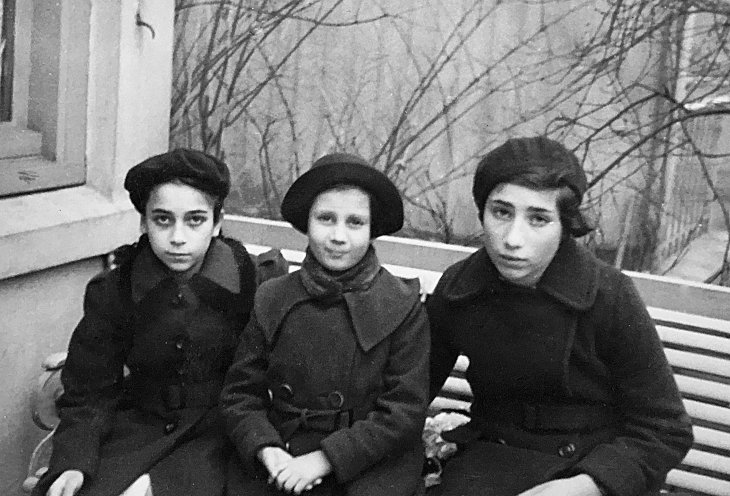 My mother on the left, and her two sisters
My mother on the left, and her two sisters
Whenever I used to think of the kindertransport (‘kinder’ is German for children) it was with gratitude to the organizers in Europe and Britain. I never gave much thought to the trauma the children and their parents must have gone through. I never stopped to imagine how my mother and her sisters felt having to leave their mother knowing that their father had already been arrested by the Nazis. Or how parents must have felt entrusting their toddlers to total strangers since it was their children’s best chance for survival, while they themselves probably had little chance at all.
How did they part? Did they put on a brave face smiling and kissing them light heartedly saying that with God’s help they would see them again in a few weeks? Did they cry helplessly having to be dragged away from their beloved children knowing they would probably never see them again?
How strong and courageous my grandmother must have been. I discovered that she went down to the Gestapo headquarters to try and secure the release of her husband while at the same time trying desperately to arrange for her children to stay with Jewish families in England.
It was only much later in her life that the trauma my mother experienced started to show through.
Growing up I always knew that my mother, who was 13 years old at the time, had been one of those saved when she came to England together with her two sisters. They were among the very few fortunate children who were reunited with their parents shortly afterwards, when they too managed to escape the Nazi clutches.
It was only much later in her life that the trauma my mother experienced started to show through.
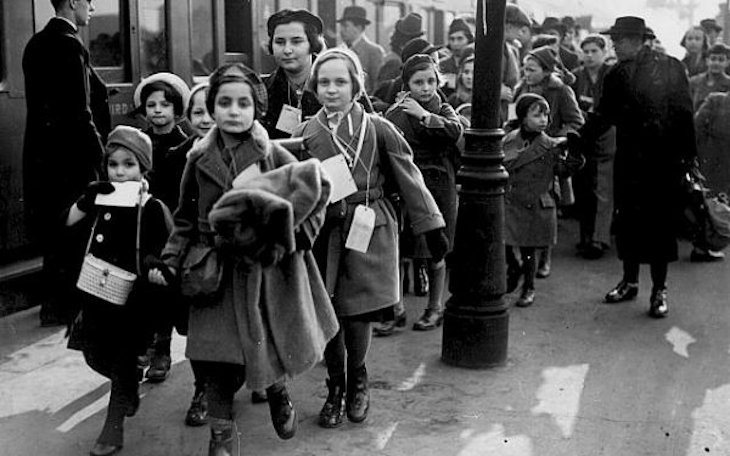 Austrian Jewish refugee children, members of one of the Children’s Transports (Kindertransport), arrive at a London train station. Great Britain, February 2, 1939. Photo: USHMM
Austrian Jewish refugee children, members of one of the Children’s Transports (Kindertransport), arrive at a London train station. Great Britain, February 2, 1939. Photo: USHMM
While we were young children, growing up in a small industrial town in the center of England, the war and the Holocaust was never mentioned. We knew little about it ourselves so we never thought to ask questions. I was named Ann after the princess, Queen Elizabeth II’s only daughter, who was born shortly before me. This was a show of gratitude to the British people who had saved my mother and so many other Jewish children.
On their arrival in England the three sisters were assigned to three different families. I remember my aunt telling me, “We were lost, unhappy and scared and had no idea if we’d see our parents again. First we were separated from our parents and then when we got to England the three of us were separated from each other. We were completely alone in a strange country and no one understood us. We couldn’t talk English and our foster parents didn’t speak German.
The trauma of her first Hanukkah in England just after their arrival as refugees from Germany never really left her – it had just been supressed.
“Soon after we arrived it was Hanukkah. A time to be at home with family. It was awful. I guess we all cried bitterly during that time – I know I did.”
This helped me understand why later in life my mother started having a negative attitude towards the holiday, becoming somewhat despondent and distant from the joy of the festivities. The trauma of her first Hanukkah in England just after their arrival as refugees from Germany never really left her – it had just been supressed.
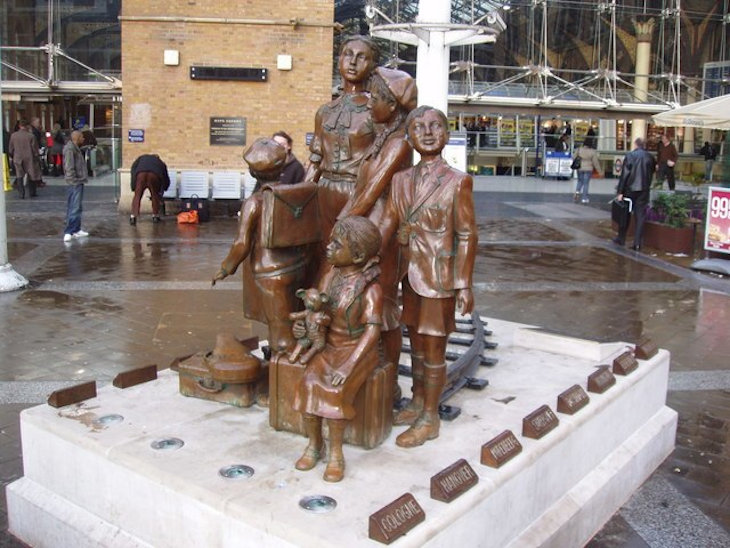 Kindertransport: The Arrival, a bronze statue at Liverpool Street station in London
Kindertransport: The Arrival, a bronze statue at Liverpool Street station in London
Throughout our childhood, Hanukkah was filled with the usual candle lighting, dreidel games, gift giving and latkes and she never told us of her first Hanukkah in the country. It was only when she was older and her thoughts returned to the more distant past, as they do with elderly people, that the terrible memories returned.
A few weeks after their arrival, their parents managed to escape to England and for a short time they were reunited. But the family, whose home my grandparents were assigned to, didn’t like children and the young girls had to be sent away once again to other families.
My mother attended the Jewish Secondary School, an orthodox school run by the legendary Rabbi Solomon Schonfeld who was instrumental in helping many thousands of children reach safety in Britain. But when Britain joined the war against Germany, in September 1939, it became apparent that Germany would inevitably bomb London and the British government decided to evacuate all the children in London to the countryside. On September 1st in an operation known as Operation Pied Piper, busload after busload of children left the capital for unknown destinations in the British countryside.
Evacuation – that meant yet another separation from their parents.
As the years went by and we, her four daughters, grew older, Mum would occasionally read to us from her war time diaries. She had kept a diary ever since she had arrived in England, including the time she was evacuated to the countryside town of Shefford during the London blitz.
Her entire school spent that time together under the tutelage of their headmistress Dr Judith Grunfeld. Once again each child was allotted a foster family, most of whom had never seen a Jew in their entire life.
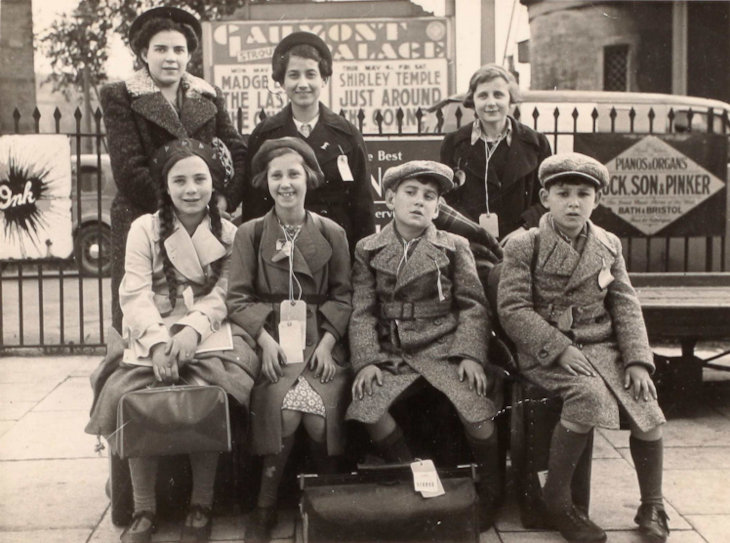 One of the kindertransport children arrives in England, 5 May 1939
One of the kindertransport children arrives in England, 5 May 1939
There were many humorous incidents while these good-hearted non-Jewish families tried to understand the orthodox, kosher-eating children who were housed with them. Why did they refuse food even when it was obvious they were hungry? Why did they go to sleep with the light on on Friday night?
For most of the children this was the last of their carefree childhood. After the war the majority discovered they were orphans. Many went from Shefford to farms in England to prepare for their future setting up kibbutzim in Israel, while others settled and made their home in England.
My mother and her sisters were among the extremely fortunate few who knew their parents were alive and waiting for them in London. Nevertheless, the separation traumas they had experienced during those harrowing years were still there, buried in their subconscious waiting to surface later on.
